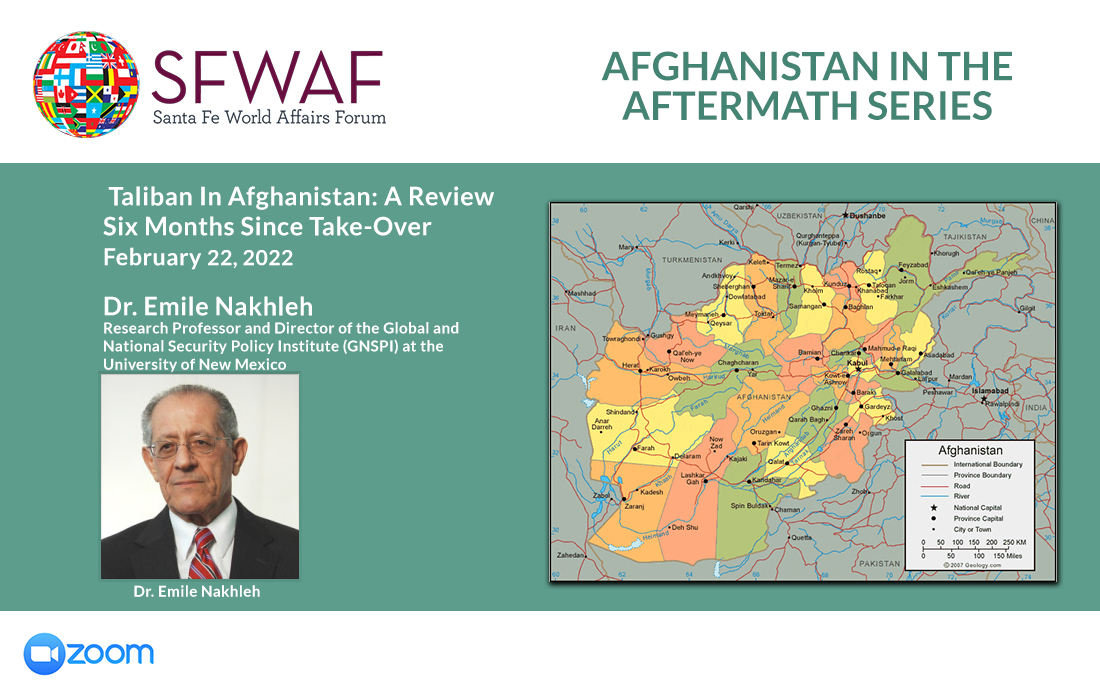February 16, 2022
Dr. Emile Nakhleh
Once the US completed the withdrawal of all American military forces and civilian personnel from Afghanistan on August 30,2022, the Taliban not only managed to forge a strategic partnership with the large and influential Haqqani network but was confronted by other challengers in this complex Afghan mosaic. All are Islamic terrorist groups operating within the “new” Afghanistan.
Who are these groups? Where are they based? Which are the most important? Do they have ties to the global Al’Qaida and ISIS Central organizations – and if so which ones do? How do they interact with the Taliban and each other? What are the differences, similarities and the alliances forged between them now that the US is gone? How do operate? What are their short and long term goals and their operational capabilities and, as a consequence, what kind of threats do they and will they likely present to the US? Will the US be able to track their activities without having “boots on the ground?”
This is the second webinar in our Afghanistan in the Aftermath series which we will be holding throughout February and part of March 2022 on Wednesdays from 12:30-1:45.
Dr. Nakhleh spoke most recently to the Santa Fe World Affairs Forum on Terrorism and the Middle East September 2016. It is a pleasure to welcome him back.
 Dr. Emile Nakhleh, is a retired CIA Senior Intelligence Service Officer and founding director of CIA’s Political Islam Strategic Analysis Program Office. He currently serves as Research Professor and Director of the Global and National Security Policy Institute (GNSPI) at the University of New Mexico. He is a National Intelligence Council/IC Associate and a member of the Council on Foreign Relations. Since retiring from the US Government in 2006, he has consulted on national security issues, particularly Islamic radicalization, terrorism, and the Arab states of the Middle East. He has published frequently on the “Arab Spring” in the Financial Times and Cipher Brief.
Dr. Emile Nakhleh, is a retired CIA Senior Intelligence Service Officer and founding director of CIA’s Political Islam Strategic Analysis Program Office. He currently serves as Research Professor and Director of the Global and National Security Policy Institute (GNSPI) at the University of New Mexico. He is a National Intelligence Council/IC Associate and a member of the Council on Foreign Relations. Since retiring from the US Government in 2006, he has consulted on national security issues, particularly Islamic radicalization, terrorism, and the Arab states of the Middle East. He has published frequently on the “Arab Spring” in the Financial Times and Cipher Brief.
He holds a Ph.D. from the American University, Washington, D.C., in International Relations, an M.A. from Georgetown University in Political Science, and a B.A. from Saint John’s University, Minnesota, in Political Science. He is the author of numerous academic books and scholarly articles. He is currently President of the World Affairs Council – Albuquerque. He and his wife, Ilonka Lessnau Nakhleh, live in Albuquerque, NM.
The Speaker


